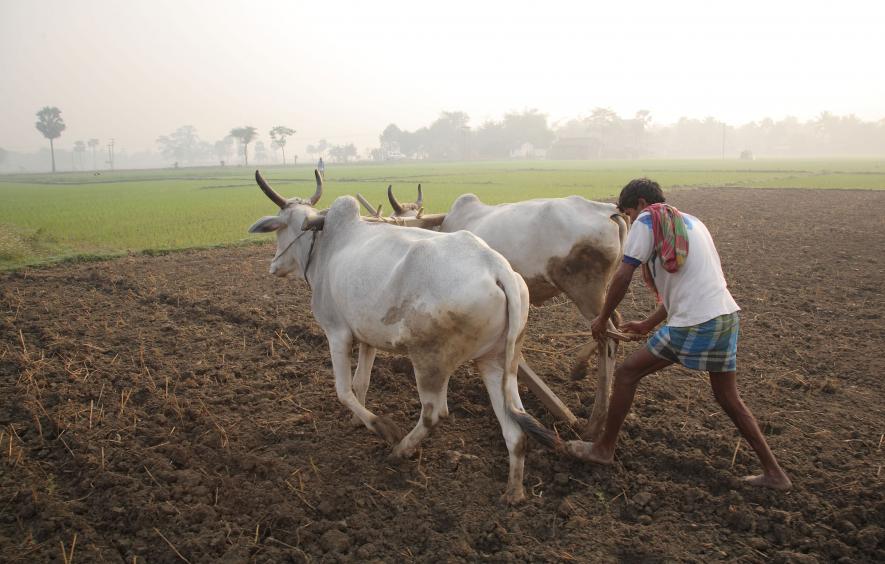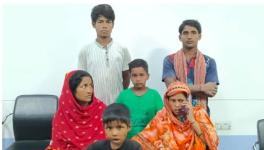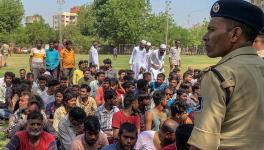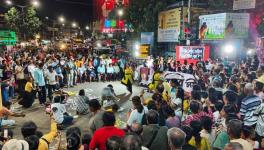COVID-19 in Rural India-VIII: Unable to Sell Harvested Crops, Bengal Farmers Stare at Indebtedness

Representational image. | Image Courtesy: Wikimedia Commons
This is the eighth report in a series that provides glimpses into the impact of COVID-19-related policies on life in rural India. The series, commissioned by the Society for Social and Economic Research, comprises reports by various scholars who have been conducting village studies in different parts of India. The reports have been prepared on the basis of telephonic interviews with key informants in their study villages. This report summarises the impact of the nationwide lockdown on three villages—Gopinathpur, Krishnapur and Sarpalehana – and highlights that peasants in these villages--most of whom have very small landholdings– are facing severe problems in selling the recently harvested crops. Landless households are the worst affected class in the villages. They are going through severe distress because of inability to migrate for work.
Gopinathpur, Krishnapur and Sarpalehana villages are located in three different agro-ecological zones of the state of West Bengal. The extent of irrigation availability, and thus the intensity with which land can be cultivated, varies across these regions. Gopinathpur is in the Kotulpur block of the Bankura region, which is agriculturally one of the most developed regions in West Bengal. On the other hand, Krishnapur in Nadia district is in a region that has seen considerable growth in agriculture because of the expansion of groundwater irrigation. This is also a region where considerable inter-state and international out-migration takes place. On the other hand, brick kilns in the region draw migrants from the western districts of West Bengal and Jharkhand. Sarpalehana in Birbhum district is in the red laterite soil region of West Bengal where irrigation availability is poorer and agricultural yields lower. Adivasis constitute a significant proportion of the population in this region.
There are three agricultural seasons in these villages: aman (the main monsoon season in which paddy is the main crop, although some regions also cultivate pre-monsoon crops of rice or jute), rabi (the winter season, in which potato or mustard are grown), and boro (the summer season, in which an irrigated crop of rice or sesame is grown).
Gopinathpur
Farmers in this village predominantly grow paddy, potato, and sesame. The harvesting period for the potato crop occurs between the end of February and the middle of March, and the harvested crop is taken to the market in March and April. As per the state government’s directive, potato harvesting was not hampered and the sale of potato continued until March 28. However, after March 28, it has not been possible to transport potato to the town, and only small quantities are being sold within the village.
Due to an outbreak of blight as well as a bout of rain before the harvest period, the potato crop was damaged, especially in low-lying areas, leading to delayed harvest and lower than average yield. Thus, the farmers have had to endure severe crop loss this season—many have lost between 50% and 70% of their crop—both weather-induced and through a shortage of labour during the harvesting period. Although the lower harvest resulted in higher market prices, farmers often could not hold their produce because of prior agreements with traders from whom they obtain inputs on credit. With the fallout of the COVID-19 pandemic and government regulations put in place, many farmers rushed to sell their harvest and could not negotiate prices. In the month of March, the producer prices of the most common ‘Jyoti’ variety of potato in Kotulpur was Rs 11 per kg. Part of the potato crop is usually put into cold storage in preparation for the second marketing season. However, a shortage of labour in cold storage facilities has resulted in operational issues that are interfering with the timely sorting and storing of potatoes.
The regular selling of other vegetables has also grown limited: the nearest vegetable market is Patpur, which is five km away from the village. Farmers with no means of transport are unable to sell their produce there, and so they sell at the local market, but the number of customers is limited.
Agricultural labourers from Purulia district, west of Bankura, work in this village during the peak agricultural season, but they have been unable to travel here due to the restrictions on movement. Even agricultural labourers residing in the village are not working due to fear of COVID-19 infection. However, despite this labour scarcity in the village, there has been no increase in agricultural wages so far. A few local workers continue to work, mostly on piece-rate contracts with cultivators. Small peasants continue to work using family labour including, in cases, with participation of members who have not been able to migrate out from the village.
Agricultural input shops are closed, and there is no fresh supply due to the non-availability of transport. This is a concern as the period from the end of March to the first week of April is when the transplantation of Boro paddy takes place. The issue is not a lack of seed supply, since it was done last month. But a lack of access to fertiliser and pesticide will cause a crisis, especially for small farmers, who do not maintain large stock of these and often obtain them on credit in exchange for sales agreements of their produce.
Due to a shortage of labour and agricultural inputs, farmers are allocating less land to Boro paddy cultivation. However, tenant farmers, working on land that has already been leased on fixed-rent contracts for the season, will incur losses if they have to reduce the cultivation of Boro rice or if the yields are low because of inability to invest in inputs.
Many male inhabitants of this village work as daily wage construction workers in other districts and states. These workers, as well as other migrants, returned to the village around the middle of March. There is some concern, especially among the construction workers, about whether the contractors would again employ them after the lockdown is lifted. In any case, the contractors will not pay them for the days that the construction work has been halted. Small non-agricultural businesses in agricultural households, especially confectionery, garment shops and snack stalls, face losses since the lockdown has forced them to close. The village currently does not have any MGNREGA work available.
Krishnapur
Krishnapur village is 25 km away from Krishnanagar township in Nadia district. The village has a significant number of agricultural households, with many members of these households having migrated to work outside the country, especially in the oil palm plantations in Malaysia. Most of these migrants have been unable to return to India due to a lack of financial means. However, many interstate migrants who work in the construction sector managed to return from Karnataka and Gujarat, as well as other states, by the middle of March. The brick kilns have been closed sinc the middle of March, and this is expected to affect migrant brick kiln workers adversely.
The major problem faced by those in agriculture is a shortage of labour on account of the lockdown. April is the month for jute sowing. A large amount of labour is required for preparation of land and sowing of jute crop. Hired labour is unavailable at present and the sowing is being undertaken using family labour. Agricultural input shops in the village are closed, and the price of biochemical inputs on the black market has risen two to three rupees per kg. Jute must be harvested before the rainy season so that it can be soaked in the canal to prepare it for retting.
Additionally, farmers in the village have a significant amount of land dedicated to growing marigold flowers, and this is the season in which the flowers are usually picked. The complete shutting down of the flower market owing to the lockdown will result in a huge loss to marigold farmers. In most years, marigold, cultivated on small plots of about 5-10 cottahs (60 cottah=1 acre), gives a return of about Rs. 500 per cottah. This year, however, all the flowers will be destroyed and the farmers are set to lose about Rs 1,000 per cottah of paid-out cost. Even though, vegetable farmers have harvested their crops of onion, pointed gourd, and other vegetables, they are unable to transport their crops to the wholesale markets are in the nearby Krishnanagar township because of a lack of transport and labour. Hence, farmers are either selling at lower prices or have stopped selling at the wholesale markets. However, farmers are still selling vegetables within the village.
Sarpalehana
Sarpalehana is situated 20 km away from Bolpur town. The village has a significant number of tenant households with limited resources. Potato harvesting began in the last week of February, and farmers are still able to sell their potatoes or trade them to grocery shops in exchange for essential food commodities. Boro has already been sowed, but labour is needed for weeding and spraying the crop. A system of seasonal leases is used in the village for Boro cultivation, with farmers entering into fixed rent tenurial agreements. Tenants have to pay a fixed amount as rent in case of crop loss.
The village depends on agricultural labour coming in from nearby tribal villages during the paddy harvesting season at the end of April. A potential shortage of agricultural labour owing to restrictions on movement is a major concern for tenant farmers looking ahead to the harvest season. However, labour is available now as migrant labourers have returned to the village before the lockdown began and are in need of work. Migrant labourers are thus working as agricultural labourers within the village, but landowners are maintaining social distance. The area under Boro cultivation this season is greater compared to last year due to better irrigation facilities and good rainfall. Many summer vegetables are also being cultivated on a small scale. Vegetable farmers sell their vegetables within the village because they cannot transport them to sell elsewhere.
Paddy growers have less of a demand for agricultural inputs at the moment, so access to these is not yet an issue in this area. However, vegetable growers need pesticides at regular intervals. There are no input shops in the village and farmers used to buy inputs from the market in Kopai. During the lockdown, a provisions store in the village has been providing them pesticides.
Many members of agricultural households in the village work as daily wage labourers in the construction sector in other states. They have returned to the village, but are among the most vulnerable owing to the lockdown having made their employment prospects uncertain. Some villagers also work in nearby brick kilns which are not currently operational. These workers are employed on contractual agreements and are uncertain about whether their wages will be paid.
This village also has a tribal extension, Barodanga. Many tribal households work as agricultural labourers in Bardhhaman district. They are not able to commute and their livelihoods are at risk. Most tribal households are impoverished, and most members are daily wage labourers, landless share-croppers or agricultural labourers. They are facing a serious loss of income due to the lockdown. Awareness about how to protect against possible infections of COVID-19 is very low. The Bardhhaman Seba Kendra is working to provide essential supplies and groceries. Tribal households are being given free rations, including rice and wheat, by the panchayat.
To summarise, peasants in the three villages – most of whom have very small landholdings – are facing severe problems in selling the recently harvested crops. Major crops produced in the winter season in the study villages are perishable crops, and farmers are having to sell them to village traders at low prices because of inability to take the crops to the town. In some cases, for example, marigold producers in Krishnapur, farmers are set to lose all their investment as there is no prospect of selling the produce. In some cases, farmers have leased lands on fixed rent contracts, and inability to sell the winter crop or maintain the summer crop will result in severe distress and push them into indebtedness. Jute farmers are also facing difficulties as this is sowing time for jute.
Poultry farms in Krishnapur and Sarpalehana villages have faced a shortage of chicken feed since the middle of March. In both the villages, poultry farm owners disposed off the chicken through distress sales and have closed down the farms.
Landless households are the worst affected class in the villages They are going through severe distress because of inability to migrate for work. Closing down of brick kilns, cold storages, poultry farms and markets have hit the landless workers very hard.
[This article is based on information gathered through telephonic interviews with three key informants in each village. The interviews were conducted between March 30 and April 5, 2020.]
The author is a research scholar in the Centre for Study of Regional Development, Jawaharlal Nehru University, New Delhi.
Get the latest reports & analysis with people's perspective on Protests, movements & deep analytical videos, discussions of the current affairs in your Telegram app. Subscribe to NewsClick's Telegram channel & get Real-Time updates on stories, as they get published on our website.
























